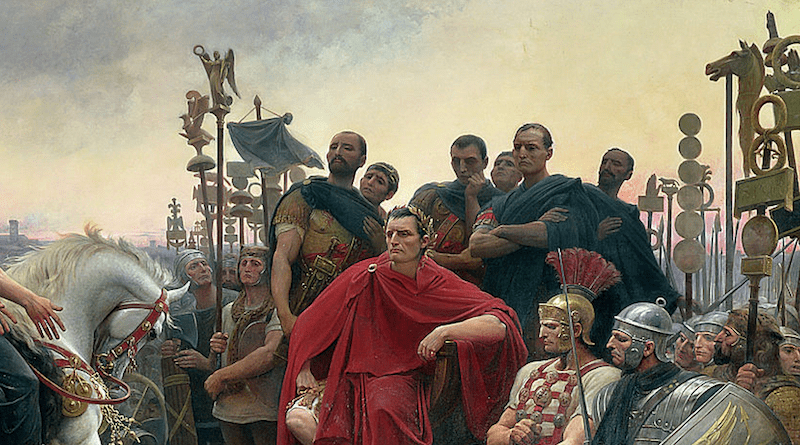
Who is Julius Caesar, How He Established Roman Empire? How Julius Spreading Roman Empire in Atlantic Sea
Julius Caesar, one of the greatest military geniuses, conquerors and politicians of the world, was patrician by origin. He has been of the few who were destined to change the course of the history and shape of destiny of the Roman Empire.
Julius is ambitions, brave, scholar and an accomplished statesman and soldier. His military genius and courage made the Roman Empire spread far and wide to the Atlantic sea-broad. Out of civil war, chaos and power struggles between Roman generals he created order and discipline and the laid the foundations of a mighty and vast empire. When he was young, a group of pirates captured him. They released him only after a payment of 20 gold all of them captured and hanged.
At the age of 41, in 59 BC, Julius Caesar became prominent when he became governor of llyricium, Cisalpine and Transalpine, Gaul (France). The appointment offered him an opportunity to prove his skills and abilities as an organizer, administrator, general and statesman. He became very popular among his soldiers because he became one of the them and lived and fought with them.
Octavian Emperor in Rome
Caesar was not only a great general soldier and statesman, but also a great reformer. He made the Senate more representatives in character by raising its strength and size. The republican senators who had murdered Caesar failed to save the republic and later Caesar’s nephew Octavian (63 BC – 14 AD) became emperor of Rome. The next four- emperors also belonged to his family.
The title of Caesar became a thing of honour and it continued till the World War First as the title of the German and Austrian rulers- Kaiser. Octavian became emperor of Rome in 27 BC and instead of taking the title of an emperor took the title of Princeps and referred to himself as the “First Citizen.” Later on the request of the Senate, he accepted the title of “Augustus,” meaning “respected one”.
God of Roman Empire – Defeated Pompey at Pharsalus
In 58 BC he effectively checked the great of Helvetti attacks. Then in 57 BC he advanced in north of the old Roman frontier to clear the territory of the German tribes. Then in 57 BC he had almost all the Gaul under him. Then again in 52 BC he crushed the Gaul’s at the siege of Alesia. His victories over Tunisia and Libya and Africa were also very significant.
He had joined with Pompey and Crassus in 60 BC and thus formed the first Triumvirate to safeguard his vital interests in the land. In 49 BC he led his army across the river Rubicon into Italy and declared war on Pompey. They had to flee across the sea to Greece. Caesar ceased the power in Rome and set up a makeshift government, with himself as the dictator. The state plunged into a civil war of the next 5 years.
After his military success Spain, Caesar sailed to Greece and in a fierce battle decisively defeated Pompey at Pharsalus in 48 BC. Pompey again fled to Egypt but was murdered there. Again he scored decisive victories against the remaining forces of Pompey at Zela in 47 BC, Thapsus in 46 BC and at Munda in 45 BC. These final victories over the Pompeian forces left him sole control of Rome and he became the master of the whole of the Roman World.
Dictatorship in Rome
In 44 BC Caesar became the dictator of the Roman Empire for life. His person was declared sacred, his statues were placed in temples and his portrait struck on coins. The month of Quintilis was renamed July in his honour. He also affected many other changes in the calendar.
January was made the first month instead of eleventh and gave it 31 days. He also gave the month of July, named after him, 31 days. He gave August 30 days but later when Augustus became the emperor of Rome. He added one day to August that he took from February to make it equal to Caesar’s month of July. Thus the number of days in each month was decided first by Caesar and then by Augustus.
Assassination by Brutus and Cassius
In 44 BC, Julius Caesar was murdered by his former friends Brutus and Cassius but by then he had founded the mighty Roman Empire. In all 60 senators had joined hands in a conspiracy of murder Caesar. Disregarding the warning of his wife, Calpurnia, he went to the Senate house where he was immediately surrounded by the 60 conspirators.
They all drew their daggers and attacked. At first Caesar tried to protect himself but when he saw Brutus also with a dagger, he gave up the fight, saying “Ettu Brute” (You too Brutus) . At last he fell dead at the foot Pompey’s statue.
Family Tragedy
Cleopatra had a son from Caesar. He was called Caesarian, meaning little Caesar. Cleopatra lived in Rome with Caesar until he was assassinated in 44 BC. Then she returned to Egypt where she is said to have poisoned Ptolemy XII, to death. She made her son a coruler as Ptolemy Caesar with herself.
Brutus (85 BC- 42 BC) ultimately had to flee to Macedonia too had to commit suicide in 30 BC when defeated with Antony at Actium. Thus came to an end of the life of the queen of beauty, corruption and intrigue.
